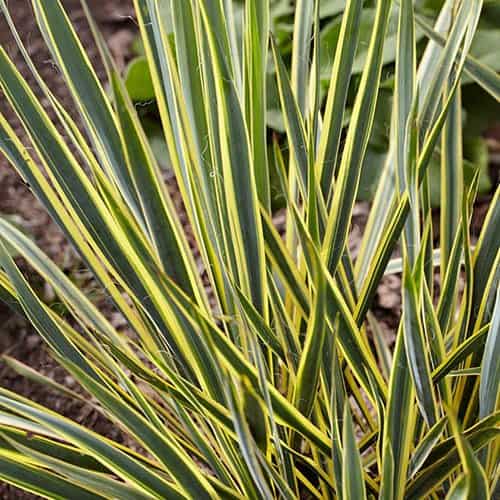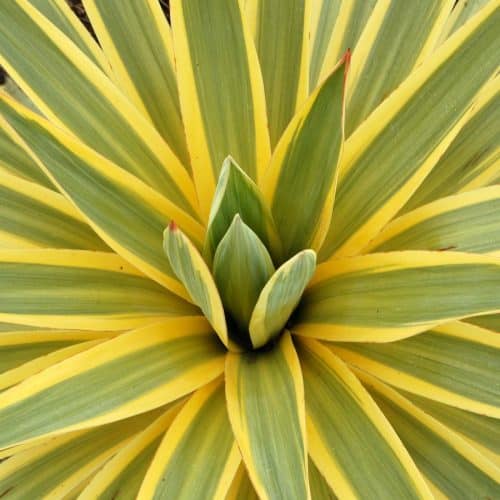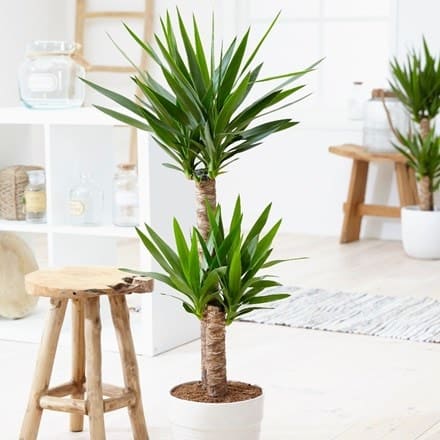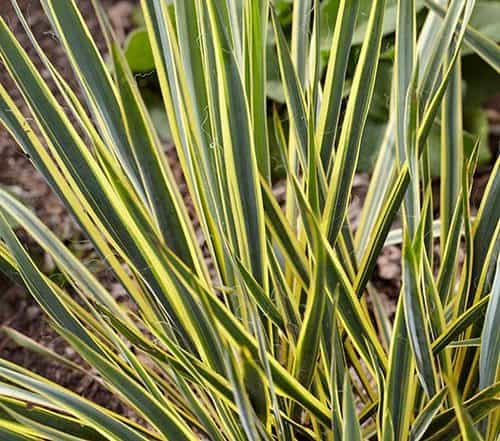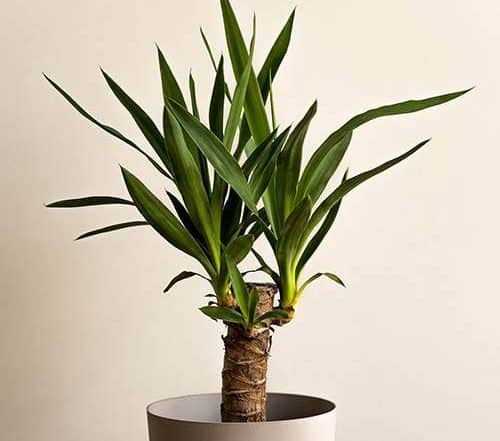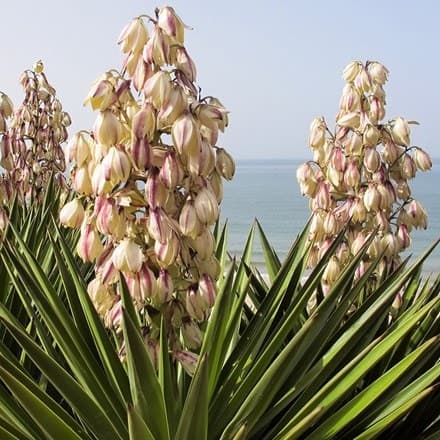Yucca Plants for the UK garden – Cold Hardy and Colourful
The majority of Yuccas are very winter hardy and very suitable for the UK garden throughout the year, and with the right soil type and location they really can thrive. Commonly mistaken for a kind of palm tree, the Yucca looks is a great plant for a UK garden to provide year round backbone and structure.
Yuccas are gorgeous plants, (and often confused with palm trees!) with striking and architectural leaf shapes creating amazing shadows and texture in your garden. They can be placed to feature on their own, but best in my opinion in clumps and groups to really create an interesting spectacle.

Yucca filamentosa
Most Yuccas will grow will, and will develop strong healthy roots quicker than you can imagine they would in this climate. There are some that require more protection than others, but nothing that can’t be achieved.
There are at least 40 species of rosette forming Yucca, similar to the many woody based evergreen perennial, trees and shrubs that you’ll find in the drier desert, plains and scrub land. Although they have sharp lance like leaves, they form gorgeous bell shaped delicate flowers, which are usually white or cream coloured. Ideally placed in a more desert style or Mediterranean garden, with similar shaped plants and shrubs such as the many palm trees that are hardy in the UK.

Yucca Gloriosa Summer Flowering
Most Yuccas survive very well in the UK, providing you offer them very well draining soil in full sun. The majority are hardly down to around -10 to -15 if you can keep them dry.
Yucca is a common ornamental plant we see all around us without recognising it. Yucca is a genus of evergreen, perennial trees and shrubs and a member of the Asparagaceae family. The yucca genus has more than 40 species and those have their cultivars that include trees, shrubs, and variegated species.
Yucca is native to North America, South America, and the Caribbean and is often found in hot and arid regions. Early species of the species were mistaken for cassava plants, also called yuca. Yucca is a rather interesting plant, and you will learn much more about its features and uses as you read this article.
Another name for the yucca plant is the Spanish dagger. It is a common ornamental plant with distinct foliage. Regardless of the species of yucca, its leaves are easily identified by rigid, pointed, sword-shaped foliage. The length of the leaves varies between 12 and 18 inches and they may be variegated with white or yellow.
These statement leaves sit at top woody stems and trunks that can range from 2 feet to 30 feet in length and 2 to 3 feet wide. Some yucca plants have a single trunk while others have multiple trunks. Yucca plants are regarded as the largest succulent trees and are capable of reaching unexpected heights. Other yucca plants grow their leaves in a rosette form without trunks, and these are regarded as yucca shrubs.
Some species and cultivars of yucca produce flowers, like yucca gloriosa ‘Variegata’ that has tall stems that shoot up above the foliage with white or cream bell-shaped flowers that attract pollinating insects like bees and hummingbirds.
Yucca is a distinct and bold architectural plant that can be used for ornamental purposes and also used as food; it is common in the Americas.
Further reading on Yuccas
- Common issues when growing Yucca plants
- How to care for Yucca plants in the UK
- How to repot a yucca plant
- How to prune a yucca plant
- What’s the difference between yucca can and a yucca plant?
- What’s a good choice for a variegated yucca plant?
Yucca is an extremely hardy plant and can survive in poorer growing conditions than most other plants, however, they are not very frost hardy. Some species are more frost hardy than others; for example, yucca elephantipes can survive in temperatures as low as 7 degrees Celsius.
Generally, they should be protected from winter frost and possibly moved indoors in extreme weather conditions. Since we have been talking about the numerous yucca species, varieties, and cultivars that exist, let’s go ahead and inform you about the most common yucca plants around.
Yucca Plant – UK Cold Hardy and Colourful
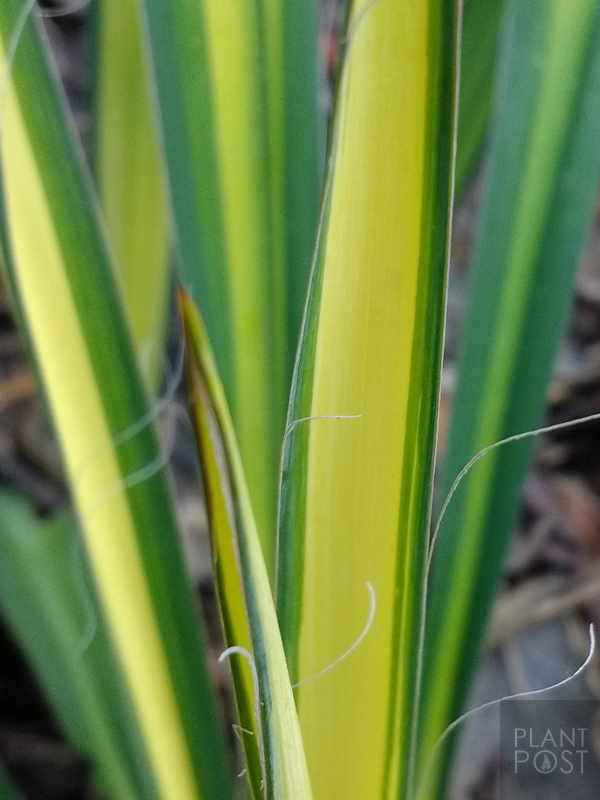
The Yucca is a plant that has distinctive strap or sword like leaves, you have probably seen Yucca elephantipes (Spineless Yucca) in garden centres being sold as a houseplant. You may have also seen the tall flower spikes of Yucca Gloriosa (Spanish Dagger) in peoples gardens, this is the most commonly grown outdoor Yucca in the UK.
Yucca elephantipes
There are many types of palm bearing palmate leaves and palm like trunks that happily grow across most of the UK and many will easily survive temperatures well below what we experience in Britain.
Y. elephantipes is a great indoor plant and commonly available. It’s a shame it isn’t more frost hardy as it would make a spectacular Yucca tree if grown outdoors. However it is unlikely to survive growing outside year round over most of the UK.
The RHS gives this plant a hardiness rating of H2 which means it cannot take temperatures below freezing. I like to experiment and over the years have created a cold hardy tropical evergreen garden meaning I only grow plants that can survive outside year round and remain green.
Over the last few years I have grown Yucca elephantipes outside to see how hardy they actually are. So far it has seen two winters with minimum temperatures down to -5°C1 overnight and several days of sub zero temperatures. So far it has survived suffering only leaf damage to some of the leaves.
I have a variegated form of Y.Elephantipe which has proved to be hardy for me over the last 4 winters, probably seen at least -5 in that time, and as you know variegated anything is usually less hardy.
Hardy Tropicals Forum2
If you wanted to grow a Spineless Yucca outside in a pot and bring it inside in the UK then you shouldn’t have any problems. I wouldn’t recommend growing it in the ground outside unless you live in one of the UK microclimates and are unlikely to suffer frosts.
Yucca Plant Types
There are a great number of Yucca plants including hybrids although in the UK the list of readily available plants is short. The Yucca plants for sale are available to buy in Britain and are grown in our climate. They range in hardiness where all can be grown in milder parts of the country and many over all of the UK.
Yucca prefer well drained soil and do not tolerate damp ground in winter or under very cold conditions. Growing them in raised ground, where the soil drainage has been improved or growing them in pots is suggested especially if you live in a region prone to extreme cold or excessive rainfall in winter.
Yucca tree
The tall Yuccas are the ones producing a stem as opposed to those that grow close to the ground and tend to be clumping. If you are looking for a trunked or large Yucca plant it is going to be more expensive on account of the number of years it takes for them to grow to a mature size.
Yucca gloriosa (Spanish Dagger)

The most commonly seen outdoor Yucca that is probably the most proven in our damp climate. Over time they will produce a trunk becoming a Yucca tree and in summer produce a tall spike of creamy white flowers which is quite spectacular.
The sword shaped foliage is quite stiff and sharp so it should be grown close to where people or pets walk by. You also have to be careful when handling them, you can quite easily cut your hand or get poked in the eye by the tips of the foliage if you are not careful.
They can grow up to over 2 metres but not much taller so will suit most gardens. They are also very tough taking temperatures down to -15°C.
Yucca gloriosa ‘Variegata’

A variegated version where the leaf edges are a cream or yellowish colour that can turn pinkish red. Not as readily available as the standard green leaved Y. gloriosa. It is also just as hardy as the plain leaved variety.
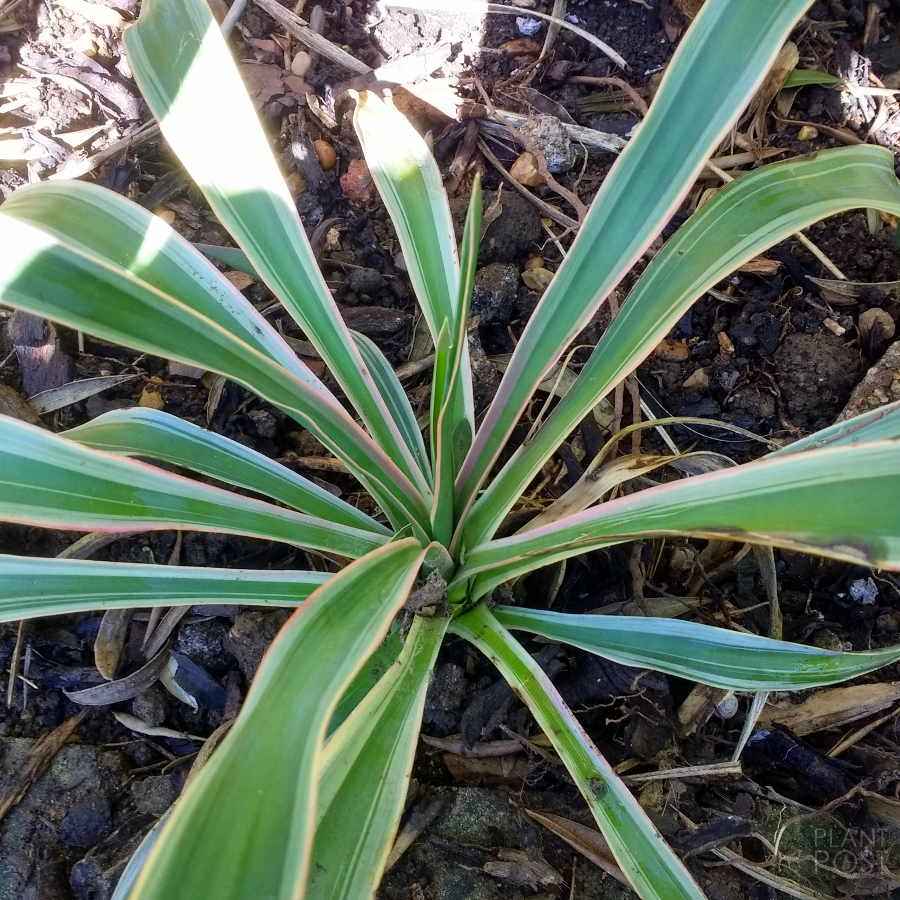
Yucca gloriosa ‘Bright Star’
A variegated Yucca with more distinct variegation than Y. gloriosa variegata with brighter and more of a yellow colour to the edges. There are also finer variegation over the green central part of the sword like leaves.
Yucca Bright Star is a beautiful looking Yucca that is also very hardy here in the UK. A great alternative to Phormium for those who live in colder parts of the UK and find that their colourful Phormiums are getting cold and wind damage in winter.
Yucca filamentosa (Adam’s needle and thread)
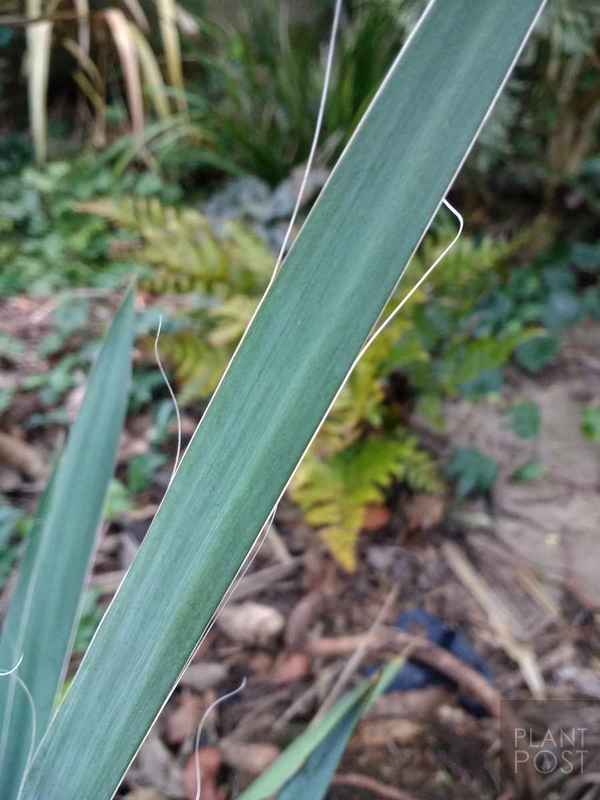
Another hardy Yucca is Y. filamentosa taking temperatures down to -15°C, not all the varieties are this hardy so I am only going to mention the two Yucca filamentosa variants that are the hardiest and are available to buy in the UK.
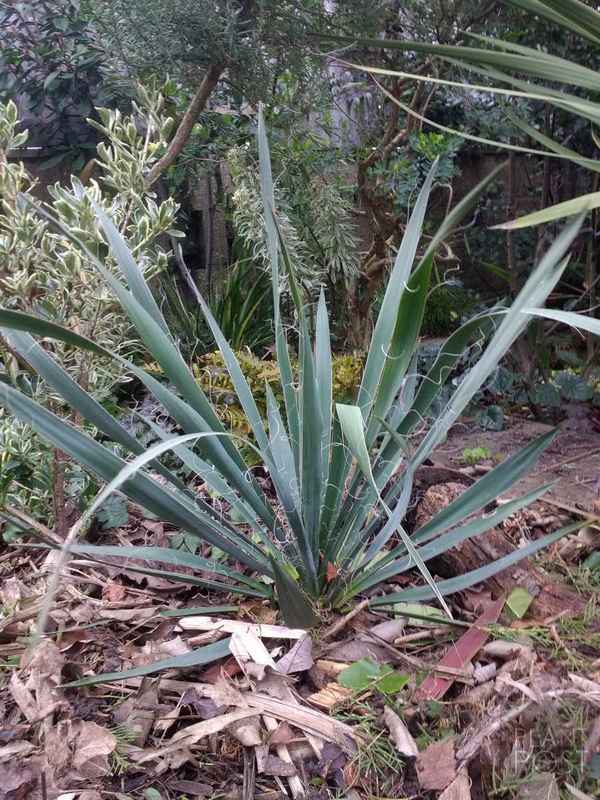
As you can see from the picture above the standard green variety looks good even in January. The sword shaped strappy leaves are softer than Gloriosa and they are also low growing, clump forming and do not produce a trunk or stem.
They prefer a dry sunny spot and are not demanding plants. They are great for mediterranean or tropical style gardens without requiring the hot weather. You can also try them in pots as they are not going to require constant watering.
Yucca filamentosa ‘Color Guard’ (variegated needle palm)
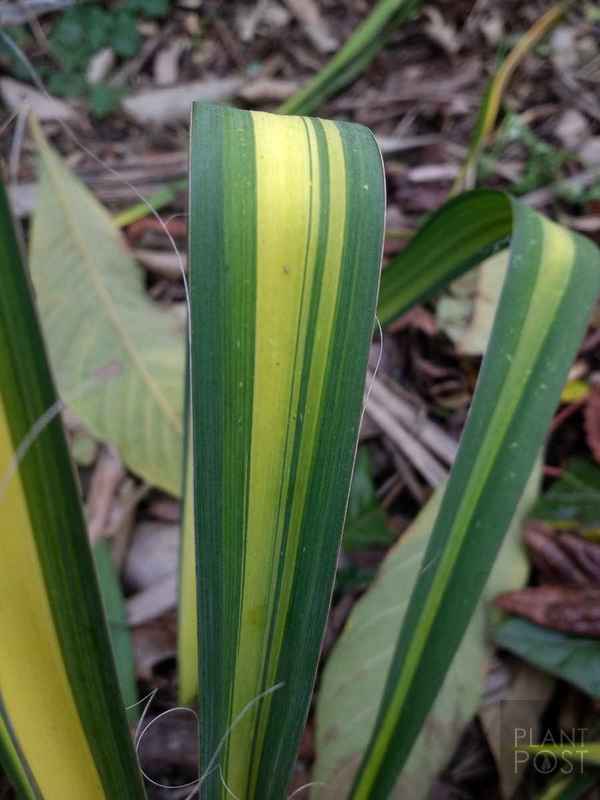
If you want a more colourful variant then Color Guard has a bright yellow central stipe to its leaves. It is more or less identical to the green version just brighter. It is one of the hardiest variegated clumping Yuccas so ideal for the UK.
Yucca filamentosa ‘Bright Edge’
If you want a variegated Yucca with the variegation around the edges then Yucca Bright Edge has green leaves with a thin yellow margin around the edges. According to the RHS3 this variant is not as hardy with minimum temperatures down to -10°C although Havliz has this listed down to -29°C4.
Yucca recurvifolia
Blueish green sword shaped leaves and very similar in appearance to Yucca gloriosa except the foliage is softer, more curved hence one of the common names being Soft Leaved Yucca.
Y. recurvifolia is not commonly available in the UK but I think is such a good looking plant that its worth buying if you see it available. Hardiness is in the region of -15°C probably being its lowest temperature as specific numbers are hard to pin down.
Yucca recurvifolia ‘Monca’ aka ‘Banana Split’
A sport of Yucca recurvifolia and a bright and tropical looking one at that is Yucca recurvifolia ‘Monca’ also more commonly known as Yucca recurvifolia ‘Banana Split’ which pretty much sums up its appearance.
Again as with the green form of this soft leaved or curved leaf Yucca it is well worth seeking it out. Hardy, bright and tropical but able to easily withstand our UK climate with A l’ombre des figuiers5 citing it can take temperatures down to -20°C.
Yucca aloifolia purpurea
I have only recently been growing Yucca aloifolia purpurea after seeing its stand out colour and stand out tropical appearance. The plain green Yucca aloifolia has an RHS H3 rating which means temperatures no lower than -5°C and this authority Yucca site recommends keeping them frost free.
The Yucca aloifolia purpurea hybrid seems to be much hardier than the standard green Yucca aloifolia.
Purpurea, which is purportedly a Yucca desmettiana hybrid has not been widley tested in UK conditions but My Palm Shop6 on the other hand lists Purpurea down to -13c. There are also reports of it taking -9c to -10c in the states and surviving.
The ones growing in my garden have been exposed to sub zero temperatures and have not experienced any leaf damage. I would recommend planting Purpurea in a well drained sunny spot with some shelter from wind and excess rain such as close to a south facing wall or fence.
As with most Yucca damp is the real enemy and a sunny spot will bring out the best in them. Purpurea benefits from direct sun as it enhances the purple colouring of the foliage. It will grow a trunk over time and look spectacular.
The leaves can be greener nearer the stem and the lower leaves if they do not get enough light. The mixture of green and purple does make this Yucca appear more visible in the garden.
Yucca plant care
As long as they are given the right conditions these group of plants are a relatively low maintenance plants. They do not require regular watering, even in pots. They do require well drained soil and plenty of sun.
The only maintenance that is really required is to remove the sometimes very large flower spike after they have finished flowering. It also makes the Yucca appear tidier if you remove the older lower leaves which can be done infrequently.
Yucca plants for sale
Yucca is becoming more popular and the range of Yucca plants for sale is much broader than it used to be. The wider range of colours and the greater hardiness compared to the likes of Phormiums means that they are a great alternative or addition to other sword shape and strappy leaved plants.
Whilst the number of outdoor Yucca plants for sale in the mainstream garden centres is minimal if sometimes non-existent the smaller specialist nurseries have as usual filled the gap.
Supporting independent growers and sellers will ensure that the rarer and more unusual forms and cultivars are available to buy in the UK.
Further Reading:
- Grow Guide: Trachycarpus Wagnerianus
- Can you eat Jelly Fruit Palm?
- Grow Guide: Butia Capitata
- How fast do Jelly Palms grow?
- How quickly does Trachycarpus Palm grow?
Other popular palm trees you might be interested in are the hardy backbone Trachycarpus Fortunei Chusan Palm, Butia Capitata, Chamaerops Humilis, Chamaerops Humilis Cerifera, Chamaerops Humilis Vulcano, Howea Forsteriana (Kentia Palm), Livistona Rotundifolia, Phoenix canariensis, Washingtonia Robusta, Areca Dypsis and Yucca Palms.
Here are some of our suggested Yuccas that you can buy from UK suppliers
Yucca aloifolia ‘Purpurea’ – Spanish Dagger
 Yucca aloifolia ‘Purpurea’ – Spanish Dagger
Yucca aloifolia ‘Purpurea’ – Spanish Dagger
These hardy purple Yuccas are fabulous hardy plants to give an outstanding tropical and structural look in your garden.
This is a special variety with dusky purple foliage that intensifies with the summer sun and winter cold.
Very hardy and tolerant of drought too this stunning purple yucca is a great substitute for cordyline and phormium plants for those colder pockets of the country.
If you are looking for something bold and dramatic these are ideal. They are also perfect in patio planters either on their own or as a dramatic centre piece.
Basic Yucca Care
Most yucca plants are low maintenance plants and relatively easy to care for. Just like most succulents, they are hardy plants that require little attention and can survive in more unfavourable growing conditions than most other plants. However, some basic care needs should be met for them to thrive relatively well.
- Soil: Yucca plants can grow in most soil types as long as the soil has good drainage. Acidic, neutral, or alkaline soil is ideal for the plant.
- Light: Indirect or dappled sunlight is ideal for yucca plants because full exposure to the sun can hurt the leaves.
- Water: Yucca plants have average to low water needs. Simply water your plant when the topsoil is at least 50% dry. Avoid overwatering because it can quickly cause root rot.
- Pruning: You don’t have to prune your yucca plants except to remove dead leaves and cut off expired flower stalks.
- Fertiliser: For indoor plants, feed your plant with a liquid fertiliser once a month.
- Winter protection: Over-winter container plants by moving them indoors.
- Insects and diseases: They are not prone to problems but insects such as aphids can be present and diseases like root rot occur in the case of overwatering.
- Temperature and humidity: No extra humidity is required but occasional misting of the leaves will be helpful. Temperature levels of 18 to 23 degrees Celsius are ideal
How Hardy Are Yucca PlantsYucca plants are generally hardy perennials though some are hardier than others. Most will tolerate poor soils regardless of the acidity, do not need much water, and remain green all year round.
For indoor and container yucca plants, you don’t have to bother about their hardiness since they can be protected from frost. For outdoor yucca plants, you have to carefully choose yucca plants that can survive harsh winters in the UK. Yucca plants that are hardy in the UK include:
- Yucca gloriosa – Frost hardiness of -15 degrees Celsius.
- Yucca filamentosa – Frost hardiness of -15 degrees Celsius.
- Yucca recurvifolia – Although not readily available in the UK, it can tolerate temperatures of -15 degrees Celsius.
- Yucca recurvifolia 'Monca' – Also known as Banana Split can tolerate temperatures of -20 degrees Celsius.
Architectural Marvels: Exploring the Diverse World of Yucca Plants in UK Gardens
Yucca plants, a genus of perennial shrubs and trees native to arid regions of the Americas, have become increasingly popular among UK gardeners for their striking architectural form and low-maintenance nature. With over 40 species, each with unique characteristics and adaptability, yuccas offer a wealth of options for those looking to introduce an exotic touch to their gardens. This article will delve into the diverse world of yucca plants, highlighting their architectural beauty and explaining why they are well-suited for UK gardens.
- Yucca Elephantipes (Spineless Yucca):
Yucca Elephantipes, known for its distinctive, swollen trunk, is an excellent choice for gardeners seeking a bold focal point. The spineless yucca boasts a visually appealing canopy of sword-like leaves atop its thick trunk. Its adaptability to a variety of conditions and tolerance for temperatures down to -5°C make it an ideal candidate for both indoor and outdoor spaces in the UK.
- Yucca Filamentosa (Adam's Needle):
Yucca Filamentosa is a hardy, clump-forming perennial with narrow, pointed leaves that produce long, curly filaments along the edges. Its tall flower spikes, reaching up to 2.5 metres, produce fragrant, creamy-white blooms in the summer. With a tolerance for temperatures as low as -15°C, this yucca variety is an excellent option for UK gardens seeking an exotic touch with minimal maintenance.
- Yucca Gloriosa (Spanish Dagger):
With its rosette of rigid, sword-like leaves and tolerance for temperatures down to -12°C, Yucca Gloriosa is a striking option for UK gardens. The Spanish Dagger produces tall, branched flower spikes adorned with bell-shaped, creamy-white flowers during the summer months. This versatile plant is suitable for coastal or exposed areas, as it can withstand windy conditions.
- Yucca Rostrata (Beaked Yucca):
Yucca Rostrata, or Beaked Yucca, is prized for its distinctive, spherical head of narrow, blue-grey leaves. Growing up to 4.5 metres tall, this slow-growing, tree-like yucca adds a unique architectural element to any garden. With its ability to tolerate temperatures down to -10°C, Yucca Rostrata is a suitable choice for UK gardeners looking to make a statement with a touch of the exotic.
- Yucca Baccata (Banana Yucca):
Yucca Baccata, commonly known as Banana Yucca, derives its name from the fleshy, banana-shaped fruit it produces. This clump-forming yucca features wide, stiff leaves with curled fibres along the margins. Although less cold-tolerant than other yucca varieties, Yucca Baccata can withstand temperatures down to -5°C, making it a viable option for sheltered locations or container planting in the UK.
Why Yuccas Are Great for UK Gardens:
- Architectural Interest: Yucca plants are known for their captivating architectural forms, ranging from trunk-forming tree-like structures to rosette-shaped clumps. Their striking foliage and flower spikes create a visually stunning impact in any garden.
- Low-Maintenance: Yuccas require minimal care, as they are drought-tolerant and adaptable to various soil types. This makes them an attractive option for UK gardeners seeking an exotic addition without the need for constant attention.
- Hardy Nature: Many yucca species can tolerate temperatures well below freezing, allowing them to thrive in the UK's variable climate
Yucca Trees FAQs
References
‣ http://www.peterboroughweatherwatch.com/reports/february2018.php1
‣ https://www.hardytropicals.co.uk/forum/viewtopic.php?p=63485&sid=08e3d8d7a688dad72d4a619ffc656308#p634852
‣ https://www.rhs.org.uk/Plants/44109/i-Yucca-filamentosa-i-Bright-Edge-(v)/Details3
‣ https://www.havlis.cz/karta_en.php?kytkaid=14954
‣ https://www.achat-vente-palmiers.com/en/yucca/278-yucca-banana-split-.html5
‣ https://www.mypalmshop.com/Yucca%20aloifolia%20%27Purpurea%276


